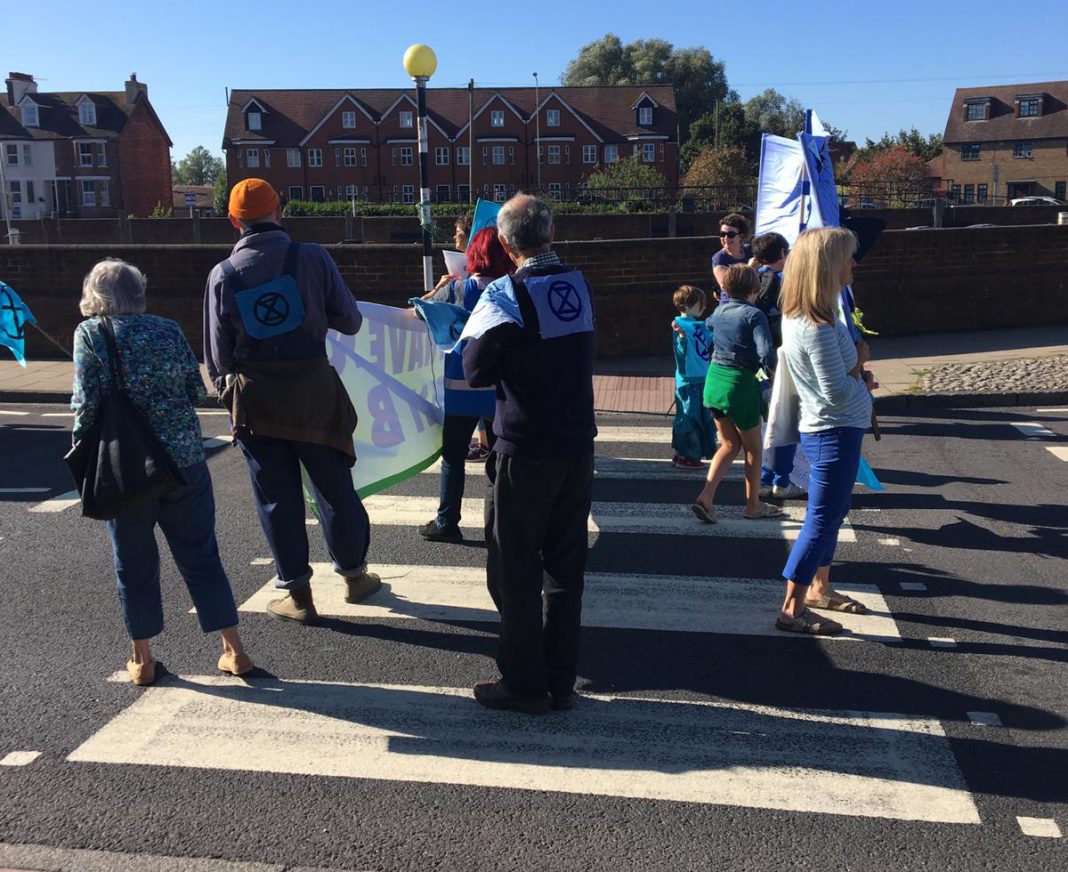I joined a group of local people holding a climate change protest in Rye on Friday September 20. With thousands of other demonstrations happening on the same day across the world, we wanted to show our support and commitment by organising some non-violent direct action of our own.
What this amounted to was a bunch of fairly timid, law-abiding people setting out nervously to see if their actions, in our own small town, could make a difference. Some of our worst fears were realised – in particular there were a few drivers who were verbally very abusive – and the police did turn up at one point to remind us (gently though) that what we were doing was potentially an arrestable offence.
We handed out Extinction Rebellion “We’re sorry” flyers apologising for the disruption, but understandably that didn’t cut any ice with some people who were inconvenienced going about their daily business. If this included you, please accept our apologies. The delay was only for a couple of minutes though, so ultimately pretty minor in the bigger scheme of things.
We were grateful that there was a lot of positive reaction too – drivers who hooted in support, waved or gave us the thumbs up. Pedestrians and onlookers stopped to watch or chat and take leaflets to find out more about what Extinction Rebellion (XR) is trying to achieve nationally and locally. We stood up and were counted: in Rye, as in countless communities elsewhere. It all added up to an international rebellion against the failure of governments and businesses to head off the climate and ecological emergency that we all now find ourselves facing.
Further action in the form of an International Rebellion will take place in London and other major cities around the globe beginning on October 7. To get involved or find out more contact ryeextinctionrebellion@gmail.com or search for the group on Facebook.
Image Credits: Giles Manning .




On the same day, I travelled through Cranbrook where a similar group took to the streets to demonstrate. Very intelligently, having thought their action through, they handed leaflets to motorists who halted at the zebra crossing as pedestrians crossed. The leaflets had many climate change facts including the climate impact of idling vehicles when stationary (currently, only 16% of cars on the roads have stop/start technology). I witnessed motorists turning off their engines. Direct action having an immediate, direct impact.
Although the cause is vital and the protesters actions admirable, had Rye’s protesters adopted the same ‘tactic’, hundreds of cars wouldn’t of sat on the streets of Rye with idling engines, exacerbating the impact that the protesters were protesting about.
I extend my full congratulations to this committed group of activists. We are, here in Rye, going to be extremely vulnerable in Climate Crisis and to future sea level rises, and all residents here must get more engaged to initiate radical change to our life styles to produce substantially less carbon. Let’s hold an even bigger rally next time round and keep this initiative rolling forward.
Tim Saunders makes an excellent point about idling vehicles. I think that it isn’t widely known how important it is to turn off vehicles when stationery. Often during school runs for instance, you can see vehicles sitting there for minutes at a time, running their engines. Same thing at traffic lights or level crossings. I do have a car with stop start technology and it took me some time to get used to it – it felt wrong constantly starting and restarting the car – like the old days where I had to try hard to stop stalling repeatedly. I have got used to it now, but it didn’t come naturally.
It is great to raise the profile of this important issue.